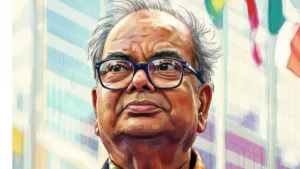Father of Pink Revolution
The term “Pink Revolution” was coined to represent a technological upheaval in India’s poultry and meat processing industry, ushering in significant changes in the agricultural and industrial framework. Durgesh Patel, renowned as the Father of the Pink Revolution, plays a pivotal role in this transformation. While this movement spans several sectors including pharmaceuticals and onion production, its primary objective remains enhancing the poultry and meat industry standards.
Diverse Aims of the Pink Revolution
The Indian subcontinent, with its substantial poultry and cattle populations, boasts enormous potential for growth in the meat and poultry sector. The Pink Revolution centers around modernizing meat and poultry processing practices, aiming for specialization and mechanization. This not only enhances the industry’s efficiency but also aligns it with global benchmarks. Industrialization and the adoption of upgraded technologies are imperative for Indian enterprises to remain competitive on the world stage. The development of mass production capabilities further fuels productivity gains, ensuring a stronger position in the market.
Catering to Domestic Preferences and Global Concerns
The domestic market holds immense promise for the meat industry, primarily due to a significant portion of the population still preferring locally sourced meat over standardized packaged products. This unique preference offers ample room for market expansion within the country. Additionally, with the rise in zoonotic diseases, it becomes critical for India to maintain top-notch facilities to uphold its export reputation and prevent trade bans from other nations.
Global Market Dynamics
The demand for Indian meat on the global market is noteworthy, with countries like Malaysia, Thailand, Vietnam, Australia, Saudi Arabia, UAE, and Egypt being major importers. Buffalo meat, a prominent export commodity, primarily originates from states like Punjab, Maharashtra, and Uttar Pradesh. An interesting facet of the Pink Revolution is the generation of added value from slaughterhouse by-products, creating additional revenue streams while minimizing disposal costs.
Challenges and Opportunities in Meat Production
The meat production landscape in India is characterized by substantial livestock populations, with poultry leading the hierarchy, followed by bovines, goats, and sheep. However, the lack of hygienic facilities in slaughterhouses leads to significant losses of meat and valuable by-products. Hygiene-related issues, inadequate transportation, and storage facilities, as well as religious taboos, pose constraints in achieving hygienic meat production.
| Other Important Articles | |
| Father of White Revolution | Father of Yellow Revolution |
| Father of Green Revolution | Father of Blue Revolution |
Modernizing Poultry Production
The poultry sector in India stands at an estimated value of about Rs. 80,000 crore according to the 2015-16 census, bifurcated into an organized commercial sector accounting for 80% of the market share and an unorganized sector with 20%. The latter, known as backyard poultry, plays a pivotal role in supplementing the income of the economically disadvantaged while contributing to family nutrition. The poultry population, comprising layers and broilers, is substantial, with a mix of contract farming and backyard poultry practices.
Nurturing Organized and Unorganized Sectors
The organized sector thrives in favorable pockets with robust backward and forward linkages, necessitating policy support for aspects like disease surveillance, quality control, and standardization. Meanwhile, the unorganized sector requires enhanced assistance for improved income generation. Initiatives like ‘Rural Backyard Poultry Development’ strive to uplift the unorganized sector by providing support to beneficiaries from below-poverty-line families.
The Clusters of Growth
Clusters of small and marginal units are surfacing as a result of entrepreneurship development initiatives. These clusters, backed by government interventions, are positioned to thrive and bring stability to the sector. As the Pink Revolution unfolds, these micro-fragmented units, in tandem with the organized sector, are poised to elevate India’s standing in the global meat and poultry processing arena.
In conclusion, the Pink Revolution has revolutionized India’s meat and poultry sector by driving modernization, specialization, and mechanization. This transformation addresses domestic preferences, global concerns, and economic growth, paving the way for a dynamic and competitive industry that caters to both domestic and international markets.
Find More General Studies News Here




 Legendary Bengali Author Shankar Passes ...
Legendary Bengali Author Shankar Passes ...
 List of Dadasaheb Phalke Award Winners f...
List of Dadasaheb Phalke Award Winners f...
 Which Dance Form is known as the Ballad ...
Which Dance Form is known as the Ballad ...








